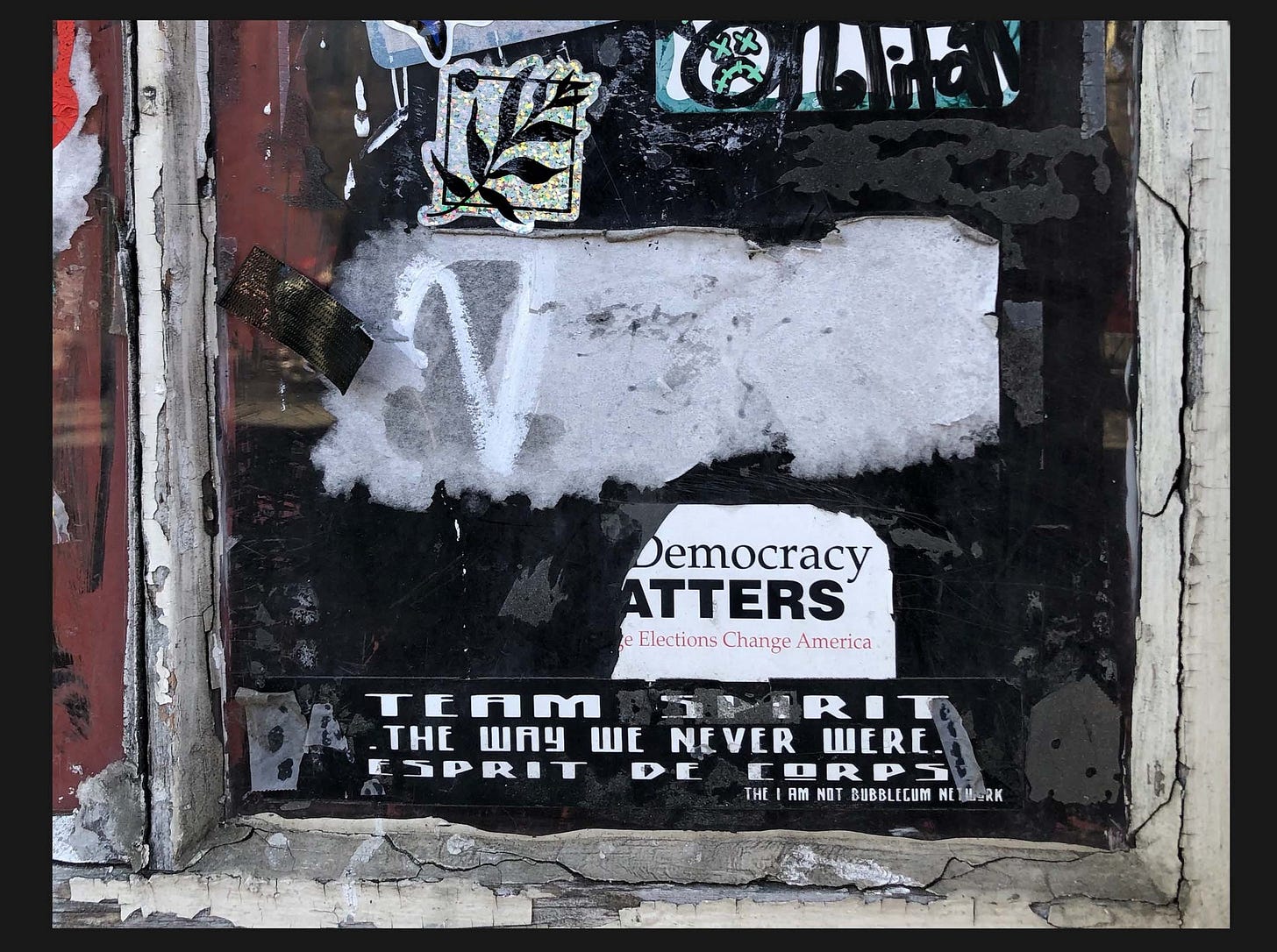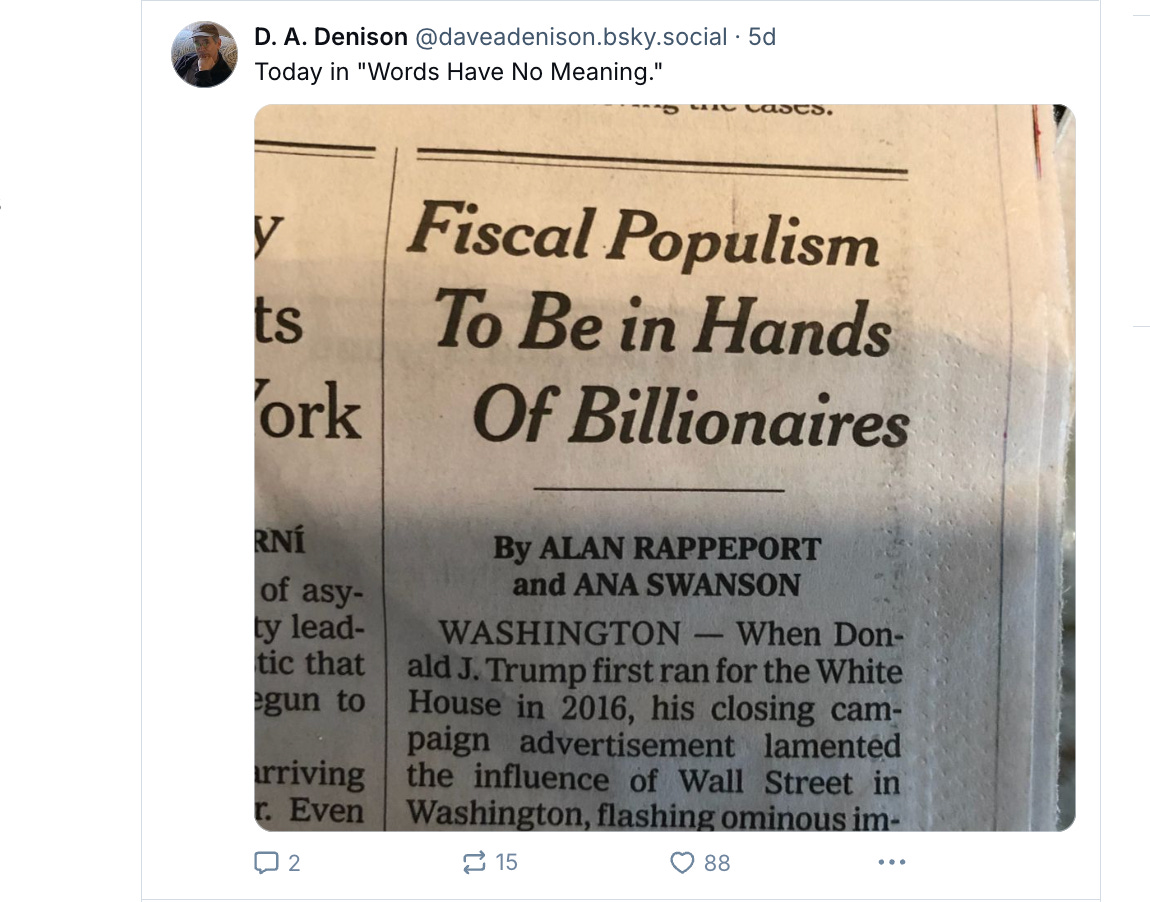Dear Readers:
There ought to be a good German word, or at least a psychological term, for a particular experience I’ve been thinking about lately. It’s that feeling you get at a point in the day when you become aware, again, of some bad turn of events. You’ve been concentrating on the task in front of you, putting other things out of your mind, and then you pause and there it is again. Maybe it’s that you screwed up at work. Maybe someone you care about has become unreachable. Or you said something you really wish you hadn’t said. Maybe it’s because you read a newspaper that morning, or made the mistake of looking at social media, and a story or comment lodges with you instead of dissipating into the ether the way most news items do.
It’s like having a dead mouse in the wall. Things seem fine and then you walk past that place where something isn’t right. Is there a dead mouse in there? Oh god, what if it’s a dead rat? But there’s nothing you can do! You can’t tear open the wall and search for it. You walk away hoping the passage of time will solve the problem. But this can go on for weeks. Every time you smell that smell you are hit with that same bad feeling.
It doesn’t take much to upset our equilibrium. When I was a kid I would spend lazy summer afternoons watching the Chicago Cubs on WGN. My sisters would notice that on days when the Cubs lost, which was most days, I would seem to be in a sour mood. They didn’t care about the Cubs, so they could see this as an amusing sort of mental disorder. But I was having the most common experience of fandom: the irrational belief that “the good guys” are up against the hated enemy. The thing that causes you to get sucked into fandom is when you begin to care. You watch a group of athletes and you identify with their battles. You say “we won” or “we lost.” And in those happy moments when you see the bad guys fall short you want to call out, as legendary Celtics announcer Johnny Most used to, “justice prevails!”
This isn’t depression I’m talking about, which is persistent. The disappointment of seeing your team lose goes away pretty quickly, just as most setbacks fade from our thoughts over time. Tomorrow’s another day. For Cubs fans it was always “wait til next year.” And once in a while, next year arrives. If the team you care about wins the World Series there’s a pleasant buzz, a feeling that all went as it should, and it can last for a few days, even as you know that the victory has no real effect on your day-to-day life. In many cities, when a team wins a championship there will be a parade a week later and a million people will throng the streets.
The parallels for those who care about politics are obvious. Normally, the coping mechanisms of political partisans are similar to those of sports fans. In politics, people get caught up in seeing their side as righteous and the other side as the ones in black (or red?) hats. But in the world I grew up in, as elections would come and go, you’d feel bad for a few days about a defeat, and then accept that “you win some and you lose some.” Wait til next time. The pendulum will swing back the other way.
One of the unfortunate developments in today’s politics is that many of us are losing a sense of equanimity in politics. It felt so unbearable to see Tr*mp elected in 2016 that I couldn’t sleep through the night for some time after that election. That had never happened to me before. I’d wake up at three in the morning and think “is this happening? Is he really going to be president?” Then it was hard to go back to sleep. As things moved forward, you couldn’t help being aware that those on the other side, the MAGA partisans, had also lost the sense that things would even out. Many of them were so unhinged by the election of Joe Biden in 2020 that they went to Washington D.C. and rioted. The guy from the tiny insignificant state of Delaware who (it seemed to me) was the most unthreatening, status-quo-oriented, milquetoast politician in generations was, to them, a usurper who should not be allowed to take office. Even those ordinary Republicans who stayed home seemed to believe Biden and the Democrats were going to accomplish some sort of radical transformation of America, where the wealthy would be too heavily taxed and people would expect free health care and white people would be displaced by hordes of immigrants.
In these recent weeks after the 2024 election, we have gone about our daily activities, and the political and financial systems have hummed right along. I was getting an eerie feeling. I’d watch the Celtics on TV, and the fans were cheering, and the transportation system was taking people here and there, and the stock market was going up, and all was calm and orderly at the supermarket, and we bowled as usual in the Thursday night league, and the whole country seemed ready to pretend that everything was perfectly normal. Families got together, as always, and ate turkey for Thanksgiving. Then the usual commercial blitz and infernal holiday jingles began their annual assault. The specter of deportations, trade wars, political retribution, and a new wave of brazen corruption—those are all abstractions, part of the unknowable future. A great many of us would feel several times a day as if we just got a whiff of a dead animal in the wall, which is disturbing, but what are you going to do. Probably just as many were still feeling the warm satisfaction of a Great Victory, enjoying the sense that this time the good guys won. This strange period between election and inauguration is one of feelings and portents; but after January 20, new schemes will be launched, new fortunes made, and a new group of vulnerable people will be under attack.
From across the widening divide, we fear different futures. There are those who seriously believe that if Trump would have lost this time, the country would be destroyed. There are those who believe Trump’s victory will steer us toward a democratic breakdown, maybe toward fascism. A lot of people, I’m sure, assume nothing much will change. Just another election, just another president, and in four or eight years the pendulum will swing back the other way.
The future I fear is one of damage on many fronts—and not the normal setbacks we expect when the other side takes their turn in power. It’s true that every administration wages some kind of war on refugees and immigrants. Now it will be conducted with a zeal for highly publicized cruelty. (A great mass of nominal Christians will cheer that on.) Anything perceived to be the agenda of liberal Democrats—like sensible environmental regulation and a less carbon-intensive economy—will be flamboyantly reversed. The courts will be further skewed toward Republican ideologues who very much believe in their own brand of judicial activism. And an administration loaded with blinkered billionaires is going to have a hard time acting on the kind of anti-corporate rhetoric that came from Robert F. Kennedy Jr. and J.D. Vance and the other faux populists on the Right. It’s more likely they’ll weaken government agencies and cut taxes, which always works to the benefit of the corporations and the wealthy.
But here’s what I hate most about these ideologues, crackpots, and fatcats who will hold federal power for the next few years: They are going to try to crush the opposition. Not because they want to win a few elections, as every partisan does, but because they want to strike at the normal practice of politics that allows for opponents to win the next round.1 Controlling the court system is a big part of that, but so is the prominent role of billionaires like Elon Musk. It’s one more way of intimidating the rest of us by saying you will never have the kind of power we have. The appeal Democrats made to “saving the democracy” obviously fell flat, probably because a lot of people think “what democracy?” I think the real emergency is whether we can save politics itself: I mean politics in the sense that British socialist Bernard Crick used the word: as the only way that divided societies can make decisions without resort to force and violence.2 Politics so defined is essential to freedom, and does not exist under despots. But the practice of politics depends on people’s belief they can do something—that participation can turn things in a different direction. And that leaders can be held accountable. Tr*mp’s message to anyone who opposes him has always been “you can’t touch me.” We’ve never seen someone with this kind of lifelong conviction that he is simply above the law at all times, in all ways. And now the Supreme Court has ruled that whatever this president chooses to do in his “official capacity” cannot be said to be illegal. What an intolerable insult—what a humiliation!—to anyone who wants to live in a country where the president is not treated as an all-powerful ruler. You would think that would be most of us, but the election said otherwise. And now we’re about to find out how people like it.
We’ve been inundated with post-election analysis in these weeks after that dreadful election, and even some journalist friends have admitted to me they are tuning it all out. Now I’ve just added to it. Moreover, I have a bunch of new readers on my free subscriber list3 and it would have been more cheery to welcome them with something uplifting. I guess my sense is that as we move through these probably disturbing and chaotic next few years, our ability to talk politics with each other should be strengthened at all turns. That’s part of being political, too, and perhaps finding common cause. But also we need to give ourselves and each other a lift whenever possible. In that spirit, here’s a recent photo of the Dog Bert (left), hanging out with a rambunctious new friend named Daisy Walsh that he met on a recent trip to Vermont.
Speaking of connectedness, many of you on this list have had the good sense to stay away from X-Twitter over the years. Now controlled by the world’s most repellent multibillionaire, that platform is like a neighborhood that’s been taken over by wild hogs. Many of us have migrated to BlueSky, which is, for now, um . . . pleasantly useable and comparatively unpolluted. Engagement is not bad, now that BS (!) is approaching 25 million users, up by about 10 million since Election Day. Click on the image below if you wish to check it out.
A good line from Paul Krugman’s final column in the NYT the other day:
“Some of the angriest, most resentful people in America right now — people who seem very likely to have a lot of influence with the incoming Trump administration — are billionaires who don’t feel sufficiently admired.”
Ah, but you see, that’s why they are “populists”—they are angry about the rule of the elites!
Look at the way Republicans in the North Carolina legislature moved to strip the newly elected Democratic governor of certain powers.
From Crick’s Essays on Citizenship, published in 2000: “If political solutions, or rather—as is ever the case, political compromises—are not found, power blocs will struggle harder and harder, more and more ruthlessly and competitively, in a world of increasing demands and of diminishing resources, to maintain the standard of living of at least a voting majority of their own loyal inhabitants.”
Thanks to those who have recommended Dots & Arrows, especially Evan Grossman, who started Evan’s Substack, a politics newsletter.









Maybe the word could be “werkspatz”, korruptekraft, or “lügenfabrik” or maybe “volksfurcht”! I could probably go on!
Great pov, by the way.
I have an ominous sense that something new and sinister has infected the republican guard, and that honest participation in a democratic republic is not part of it. We are in perilous times.
I was listening to NPR this morning and they considered that the post-merger financial managers at Boeing perhaps thought that Boeing was "too big to fail" no matter how reckless their financial "engineering" became. Of course, they all but ruined Boeing.
It strikes me that far too many republicans may wish to think that, no matter how much they indulge Trump, "America" and American democracy" (whatever that may mean to them) is similarly too big to fail, too secure to undermine.
Unfortunately, once a well is true and well poisoned our intentions, wishes and beliefs are irrelevant. It merely becomes a relic, a reminder of a better past that cannot be reclaimed.
***
The chemical formula for the deadly poison hydrogen cyanide (HCN) is disarmingly simple looking. A reminder that the most perilous things need not be shrouded in complexity and subterfuge. Sometime the threats is just as simple and direct as it appears, yeah? Both for wells and for systems of government.